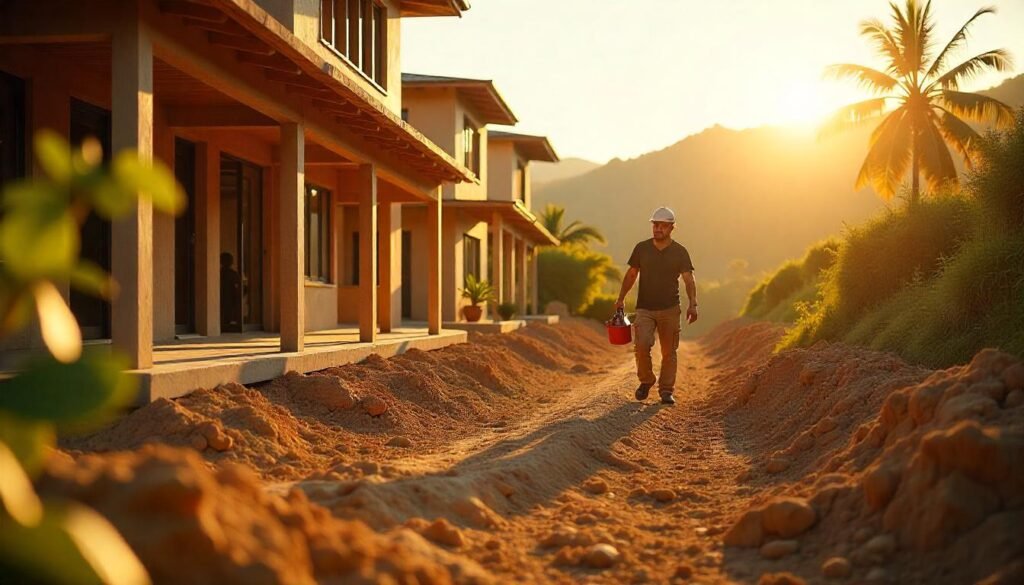Costa Rica — a place where lush jungles meet sun-kissed beaches, where “Pura Vida” (the simple, good life) is more than just a slogan, it’s a way of being. To many expats, the idea of purchasing property here seems like an effortless dream. The prospect of waking up to the sounds of tropical birds, sipping morning coffee by the ocean, or investing in a piece of paradise has its undeniable allure. But while the lifestyle is undeniably seductive, there are several layers beneath the surface that require careful consideration.
The Allure of a Costa Rican Life
Costa Rica has long been a beacon for foreigners seeking an escape from their fast-paced, high-stress lives. Known for its biodiversity, safety, and commitment to environmental conservation, the country offers a lifestyle that’s more laid-back and in tune with nature. From the bustling city of San José to the tranquil beaches of the Nicoya Peninsula, there’s something for everyone — whether it’s surfing the Pacific waves, hiking through cloud forests, or enjoying a sunset over the Caribbean.
Beyond its natural beauty, the country’s strong focus on eco-tourism and sustainable living has earned it a reputation as a progressive and forward-thinking destination. With modern infrastructure, excellent healthcare, and a warm, welcoming culture, it’s no wonder that foreigners are flocking to buy property in Costa Rica. Whether for retirement, vacation homes, or rental investments, this Central American gem draws in buyers from all over the world, eager to capitalize on what seems like an idyllic lifestyle.
Legal Considerations: Understanding the Fine Print
For all its appeal, purchasing property in Costa Rica requires careful navigation through legal waters. The good news is that foreigners can legally buy property here, and there are no restrictions on ownership for non-residents. However, the process isn’t without its complexities.
First, foreigners must work with a trusted real estate agent and lawyer, both of whom should be well-versed in Costa Rican property laws. Due diligence is crucial. While Costa Rica is known for its transparency, some issues may arise regarding land titles or zoning laws. It’s essential to ensure that the property has clear, marketable title and is free from any encumbrances or legal disputes.
Additionally, foreigners should be aware of the process for transferring property into their names. Many expats opt to create a corporation to hold property, which can help with estate planning and provide a degree of liability protection. However, establishing a corporation also comes with its own set of legal requirements and ongoing costs.
Finally, purchasing property near the coast — especially in popular areas like Tamarindo, Playa Jaco, or Manuel Antonio — may require extra scrutiny. A 200-meter coastal buffer zone restricts the ability to buy beachfront property outright. But with the right legal guidance, there are still ways to navigate these restrictions and secure a desirable location.
ROI Potential: Turning Paradise into Profit
The dream of owning a slice of paradise is one thing; turning that dream into a profitable venture is another. With the country’s steady growth in tourism, rental properties — especially those in prime locations — can offer substantial returns. Costa Rica attracts millions of visitors annually, and many of them are willing to pay top dollar for short-term rentals, whether for a week at a beachfront condo or a month in the rainforest.
Properties in highly desirable regions can yield impressive returns if managed properly. Airbnb and vacation rental platforms have made it easier than ever for expats to monetize their homes, particularly in areas like Manuel Antonio, Santa Teresa, and the Arenal Volcano region. Depending on the location, property type, and how well it’s marketed, some owners report rental yields of 8% to 12% annually — a solid return in comparison to more traditional real estate markets.
However, before diving into rental properties, it’s important to keep in mind the operational costs, such as property management fees, maintenance, taxes, and insurance. Many investors in Costa Rica prefer to have a property management team handle these logistics, ensuring the property remains in prime condition for guests. While this adds to the cost, it can provide peace of mind, especially for those who are new to the area or prefer a hands-off investment approach.
Additionally, Costa Rica’s real estate market has shown consistent growth over the years, although like any investment, it comes with risk. The potential for capital appreciation is there, but it can vary by region, property type, and market conditions. Certain areas have seen property values soar, especially those that are just beginning to gain traction with tourists and expats. However, much like any real estate market, there are also quieter areas where property values might not grow as quickly.
Proceeding with Caution: The Ups and Downs of Paradise
While the dream of buying property in Costa Rica sounds enticing, it’s essential to approach the process with a grounded mindset. Costa Rica is not a get-rich-quick investment, and like any foreign market, there are variables to consider. Legal red tape, fluctuating market conditions, and the complexities of managing property from afar all require careful thought and preparation.
Yet for those willing to take the leap, the rewards can be worth it. The allure of a slower pace of life, the breathtaking landscapes, and the opportunity to earn from a vacation rental can make Costa Rica an attractive destination for those seeking both lifestyle and financial growth. Just remember, Pura Vida is not just a saying — it’s a lifestyle that requires mindful consideration, preparation, and a healthy dose of patience. By balancing your aspirations with practical knowledge, you can enjoy the true rewards of investing in paradise without getting burned.
4o mini


